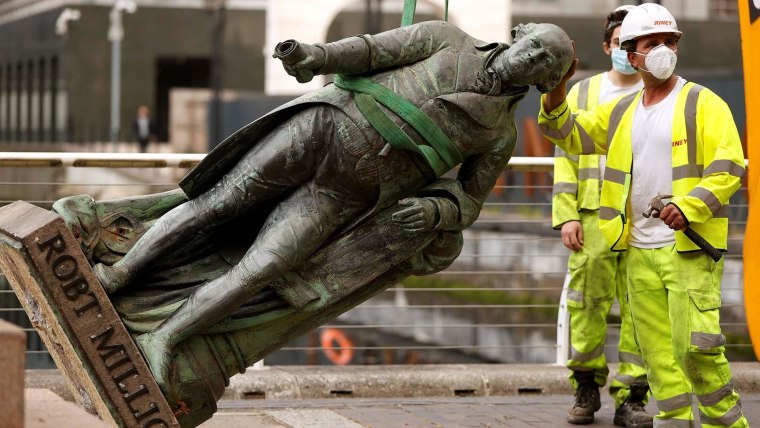LONDON — A popular stop on the London tourist trail, the British Museum now finds its own past is on public display.
Curators at the historic building in central London said Tuesday they had “redisplayed” a bust of the museum’s founder, Sir Hans Sloane, who profited from Jamaican sugar plantations, to better reflect his ties with Britain’s empire and the slave economy.
“Dedication to truthfulness is crucial when we face our own history,” Hartwig Fischer, director of the British Museum said in a statement to NBC News.
“We will continue to explore our history and we will do this in collaboration with people from across the globe to rewrite our shared, complicated and, at times, very painful history as equals.”
Fischer added that the museum, which has millions of visitors every year, had benefited from Sloane’s “radical vision” of universal public access to a national museum collection.
Irish-born Sloane was a prominent physician and land owner. Later his plantation profits, in part allowed him to bequeath more than 71,000 items to Britain when he died in 1753 — which became the founding collection of the museum.
The museum’s decision is part of a broader British reexamination of its imperial past and public discourse around issues of race, sparked by the police killing of George Floyd in Minnesota this summer.
Floyd’s death led to an eruption of global anti-racism solidarity. In Britain, this culminated in the dramatic tearing down of slave trader Edward Colston’s statue by protesters, later thrown into the Bristol harbor amid cries for Britain to confront its colonial past.
For some, the repositioning of Sloane’s statue in the British Museum is “long overdue” but does not go far enough.
“The British Museum is one of the worst offenders when it comes to the problems of how we remember history. With its treasure trove of stolen artifacts and historical amnesia over empire, it has a long way to go before we can say its headed in the right direction,” said Kehinde Andrews, professor of Black studies at Birmingham City University.
“The same is true for the debate more generally, where we are seeing a lot of tokenistic and symbolic gestures but nothing substantive that would actually address racial inequality.”
Greece has long campaigned for the repatriation of antiquities it says were stolen or illegally excavated. These include the Parthenon Marbles — known in Britain as the Elgin Marbles — that British diplomat Lord Elgin removed from the Parthenon temple, when Greece was under Ottoman rule.
The museum has said the artifacts were acquired legally and were “part of everyone’s shared heritage.” While Greece’s Culture Minister last year called Elgin a “serial thief.”
The Rapa Nui indigenous people of Easter Island, now part of Chile, have also sought the return of the “Hoa Hakananai’a” from the museum, an iconic “moai” statue.
Download the NBC News app for breaking news and politics
Some in Britain see the museum’s decision as part of an ongoing culture war. And not everyone agrees with the decision to sideline Sloane’s role.
“It’s shameful and disgraceful to do this to a man they basically owe their existence to,” said Robert Poll of Save Our Statues, a non-profit formed in the wake of this summer’s protests to protect British cultural heritage.
“To now move his statue is a huge sign of disrespect and ingratitude…it’s almost a humiliation of him.”
Poll said the decision was a “knee-jerk” reaction and that anyone in possession of a smartphone could discover the history of Sloane and others, without the need for such a move.
“We are seeing a wider cultural war, as they’re calling it, which seems to me to be an attack on our history, heritage, identity of Britain and the West in general.”
A separate spat also broke out in the U.K. this week after the BBC said it would omit words from patriotic anthems, normally sung during a pomp-laden televised concert at the Royal Albert Hall each summer, known as “The Last Night of the Proms.”
The decision has sparked a debate over censorship and the country’s colonial past.
The broadcaster said an orchestral-only version of “Rule Britannia!” and “Land of Hope and Glory” would be performed, creating a stir on social media and among right-leaning tabloids.
Prime Minister Boris Johnson waded in on Tuesday.
“I think it’s time we stopped our cringing embarrassment about our history, about our traditions and about our culture, and we stopped this general bout of self-recrimination and wetness,” he told press. “I wanted to get that off my chest.”
However, the BBC said in a statement that the anthems will not be sung due to COVID-19 restrictions.
“For the avoidance of any doubt, these songs will be sung next year,” a spokesperson said.













